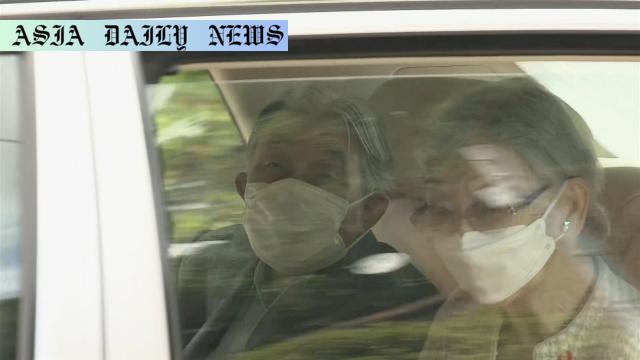Emperor Emeritus Akihito discharged from Tokyo hospital after undergoing medication adjustments for his heart condition.

Introduction: The Medical Journey of Emperor Emeritus Akihito
Japan’s revered Emperor Emeritus Akihito, now aged 91, continues to demonstrate resilience as he navigates his health challenges. On Friday, the Emperor Emeritus was discharged from University of Tokyo Hospital after a brief but critical medical stay. This visit was necessitated for an adjustment of medication intended to ease strain on his heart – a condition that has beset him over the years.
The Emperor Emeritus has a history of health complications associated with his heart, notably undergoing a coronary bypass surgery in 2012 at the age of 78. More recently, diagnoses of right heart failure and asymptomatic myocardial ischemia have significantly shaped his health care regimen. This latest intervention sought to combat deterioration in his condition, showcasing both the complexities of his treatment and his physicians’ firm commitment to improving his quality of life.
Understanding the Health Challenges
The Emperor Emeritus’s medical condition highlights the challenges of aging coupled with chronic health issues. Right heart failure, a condition diagnosed in 2022, occurs when the right ventricle fails to pump blood effectively, often leading to symptoms such as fatigue, fluid buildup, and shortness of breath. Additionally, asymptomatic myocardial ischemia – detected in May 2023 – represents a silent yet serious threat, characterized by insufficient blood supply to the heart muscle, often exacerbated by physical stress. However, his treatment has been meticulously designed around these conditions, including adjustments like fluid intake moderation and exercise minimization.
These steps, while necessary, demand significant lifestyle changes, even for someone as disciplined as Emperor Akihito. The introduction of new medication in May offered hope for symptom management, and this hospital visit aimed to recalibrate the treatment plan for maximum efficiency and effectiveness.
Emperor’s Medical History and Public Impact
Japan’s royal family has always been a symbol of unity and resilience for the nation. Emperor Emeritus Akihito, who abdicated the Chrysanthemum Throne in April 2019, holds a special place in the hearts of the Japanese people. His reign and subsequent retirement have been characterized by humility and a connection with his subjects, which make his health updates significant for the public.
His heart surgery in 2012 was a turning point, marking the beginning of a broader awareness of the aging emperor’s health struggles. Diagnosed with angina, a condition causing chest pain due to reduced blood flow to the heart, it was clear that managing his health would be an ongoing process. His abdication, largely influenced by these health issues, was an unprecedented move in modern Japan, establishing a new precedent for royal duties and dignity.
A Return to Recovery
Upon his discharge from hospital, the Emperor Emeritus was accompanied by his devoted wife, Empress Emerita Michiko, and returned home just before noon. This event underscores not only the close partnership between the royal couple but also the importance of familial and emotional support during health journeys. The adjustments in his treatment are a testament to the careful monitoring of his condition by a team of dedicated medical professionals, ensuring that his quality of life is prioritized.
As the Emperor Emeritus recovers, the new generation of Japan’s imperial family, led by Emperor Naruhito, continues its role while drawing strength and inspiration from Akihito’s dedication and courage. His story is a reminder of the universal challenges of aging and the strength derived from family and national support.
Conclusion: A Symbol of Resilience
Japan’s Emperor Emeritus Akihito is a figure of resilience and perseverance. His recovery journey, while emblematic of the vulnerabilities of old age, reflects the deep commitment to health and life management in the face of chronic ailments. As he continues to hold a cherished place within Japan’s cultural and emotional fabric, his updates remain a source of inspiration for both the citizens of Japan and the world at large.
With a medical history that speaks to the importance of early intervention, tailored treatments, and the balance of professional and personal care, Emperor Akihito’s story offers lessons for all as we navigate the complexities of aging with dignity and hope.
Commentary
The Resilience of Emperor Emeritus Akihito
Emperor Emeritus Akihito’s recent discharge from the hospital is a significant moment that underscores both the challenges and triumphs of aging with grace. At 91 years old, his journey through complex heart conditions is not just a personal one but a narrative that resonates deeply with the people of Japan and beyond.
The Significance of Public Figures in Healthcare Awareness
When public figures share their health challenges, it can lead to greater awareness and empathy. The transparent handling of Emperor Akihito’s health struggles, from his bypass surgery in 2012 to the recent adjustments in his medication, highlights the importance of proactive health management. This openness not only demystifies medical conditions like angina and myocardial ischemia but also fosters dialogue about aging and healthcare, topics often shrouded in stigma. His journey serves as an educational moment for many, especially in Japan, where an aging population faces similar health concerns.
Challenges and Inspirations of Managing Aging
The Emperor Emeritus exemplifies resilience, not just in his ability to adapt to medical challenges but also in his determination to maintain a dignified retirement. His life, marked by both privilege and responsibility, reminds us that no one is immune to the struggles of aging. Yet, his careful approach—avoiding excessive physical stress, adhering to medication adjustments, and relying on family support—serves as an inspirational model for others facing similar battles. His partnership with Empress Emerita Michiko further underlines the critical role of emotional and familial support during health crises.
Ultimately, the story of Emperor Emeritus Akihito is one of hope, perseverance, and the power of modern medicine. It’s a narrative that celebrates the intersection of personal strength, medical advancements, and collective humanity in overcoming life’s trials.


